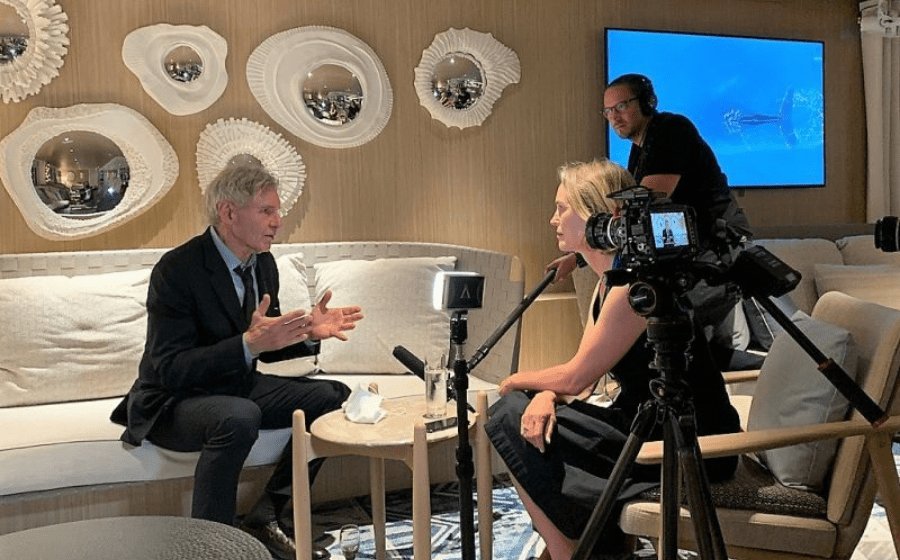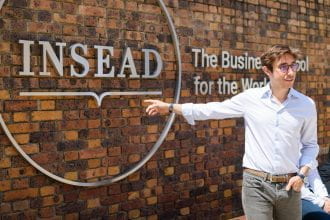
Katell Le Goulven, Executive Director of the Hoffmann Global Institute for Business and Society interviewing actor and environmentalist Harrison Ford after he gave the Opening Address at the 2021 IUCN World Conservation Congress
By aligning INSEAD with the Sustainable Development Goals, the Hoffmann Institute is accelerating the transformation of business and society.
How do you integrate a global agenda for sustainable development into a global institution for management education?
For the past three years, the Hoffmann Global Institute for Business and Society has faced this challenge head on, in collaboration with every part of the school. Since its founding in 2018, it has made steady progress in its efforts to align INSEAD with the United Nations 17 Sustainable Development Goals (SDGs), specifically by advancing research at the intersection of business and society; working to equip socially responsible leaders; engaging alumni and partners on social impact; and helping INSEAD to lead by example.
“We have begun to weave sustainability into everything that we do at INSEAD,” says Katell Le Goulven, Founding Executive Director of the Hoffmann Institute. “We have also connected what we do at INSEAD to the SDGs. This is very important, because you can do a lot of great things without systematically connecting them to an agenda.”
Now, as the Hoffmann Institute begins the acceleration phase of its five-year strategic plan, here is a look back on key accomplishments across its four pillars — Knowledge, Learning, Engagement and Walk the Talk — in the 2020/2021 academic year.

KNOWLEDGE: Making sustainability a priority
Throughout the year, the Hoffmann Institute partnered closely with INSEAD faculty across all departments and disciplines. In total, it engaged with nearly one-third (32%) of full-time faculty, which brought greater attention to sustainability research — leading to the publication of 65 new cases and articles on topics related to sustainability.
“What is significant is we worked with faculty across all nine academic departments at the school,” explains Le Goulven. “This means that sustainability is now present in every area of the school.”
The Robb Case Fund for Business and Society supports case writing focused on diversity and inclusion, sustainable models and social impact. The Institute extends its appreciation to Andrew Robb MBA’07J and his family for establishing this fund and hopes to further grow this contribution in time to come.
LEARNING: Inspiring talk and inciting action
In the classroom, INSEAD students worked with three important organisations as part of Master Strategist Day: Banlieues Santé, a non-profit that acts like a facilitator between the state medical system and the people who need its services; the Peace Parks Foundation, an international NGO dedicated to nature and wildlife conservation in southern Africa; and MiracleFeet, a non-profit working towards ending the global disability and stigma of clubfoot disease.
To connect with a broader audience, the Institute hosted conversations throughout the year on diversity and inclusion, the climate crisis, ethics, sustainability and social entrepreneurship. More than 13,000 attendees participated in a total of 28 online conversations, which featured guests including Mark Carney, Laurence Tubiana, Ouided Bouchamaoui, and Hubert Sagnieres.
The scope of these learning opportunities speaks to the belief that “sustainability should not be a niche professional area,” says Le Goulven. “It should be the business of everybody – irrespective of your job, company, industry or country.”
![[FINAL2] MSD](https://alumnimagazine.insead.edu/files/2021/11/FINAL2-MSD.jpg)
ENGAGEMENT: Bringing diverse talent together
For the third year in a row, the Hoffmann Institute teamed up with INSEAD Student Clubs to launch SDG Week. Held on 2-4 November 2021, SDG Week attracted some 1,800 registrants for nine special sessions on how business can contribute to the SDGs. The event explored topics such as redefining capitalism, catalysing systemic change, gender equality and impact investment.
Meanwhile, INSEAD teamed up with seven other business schools across Europe — Cambridge Judge Business School, HEC Paris, IE Business School, IESE Business School, IMD, London Business School and Saïd Business School — for the Business Schools for Climate Leadership, a collaboration that aims to incite, support and mobilise stakeholders to protect humanity. “These are competing business schools,” says Le Goulven. “But they’re coming together to try to see how, jointly, they can bring more knowledge to their community about climate.”
The Institute also launched a new podcast to showcase changemakers who are using business to create positive impact. Mission to Change aims to “inspire others by looking at different missions and different industries from a changemaker’s perspective,” says Le Goulven, who hosts the podcast. “It shows the impact that one person can have and asks: How does one person find the drive — and exhibit that drive — to lead change from the top, from the bottom and from the side?”
WALK THE TALK: Setting a higher bar for INSEAD
With support from the Hoffmann Institute, INSEAD continues to exemplify its commitment to sustainability. For example, its new procurement policy is aligned with the SDGs. The school also received a silver medal from EcoVadis, a leading supplier of business sustainability rankings.
Finally, the Institute is engaged in the Principles for Responsible Management Education (PRME) – a UN-supported initiative that aims to raise the profile of sustainability in business schools – with INSEAD Dean Ilian Mihov serving as Chair of the Board and Le Goulven an active member of the Sharing Information on Progress (SIP) working group.
All of this activity connects back to the school’s founding vision. “By integrating sustainability in our research, learning, community engagement and operations, we contribute to making business a force for good,” says Le Goulven. “Our work underpins INSEAD’s mission to bring together people, cultures and ideas to develop responsible leaders who transform business and society.”


